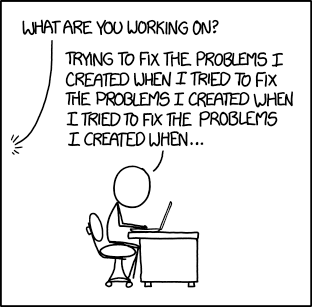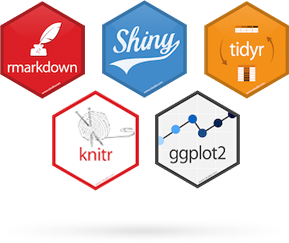Heavily inspired by Software Carpentry:
2-3 trainers + additional helpers
Sticky notes
Collaborative notepad
User accounts on a training server
Follow-up survey
Heavily inspired by Software Carpentry:
2-3 trainers + additional helpers
Sticky notes
Collaborative notepad
User accounts on a training server
Follow-up survey
Full day workshops:
Three hour sessions:
Our course material is on GitHub under a creative commons license
Have adapted some Software Carpentry material for our own course
We've also forked online material for a Python course in the past
Server set-up and management: bio-ansible
Training interfaces: R-Studio Server and Jupyter Hub
Training material: R Markdown, Jupyter Notebooks, Makefiles
Collaborative notepads: Etherpad and Google Docs
Version control and file hosting: Git/GitHub Pages
Managed by bio-ansible - open source tool for deploying bioinformatics servers
Running R-Studio/Jupyter on a training server means that partipants just need a web browser
In theory, should be smooth to get participants going but there are always new problems that crop up

Markdown is a powerful “language” for writing different kinds of documents, such as PDF or HTML in an efficient way, but markdown documents can also be published as is. The underlying idea for markdown is that it is easy to write and easy to read.
R Markdown builds on Markdown, allowing for code to be embedded and executed within the body of a Markdown document. Jupyter Notebooks also integrate Markdown and cell blocks that contain code.
Code chunks: code is easy to test and very easily embeded with text in one document.
Fully reproducible
Easy to adapt by another person
Actively being developed by R-Studio team which means it plays well with other packages developed by them


Generate html files and slides containing learning materials from R Markdown files
Each lesson contained to a single R Markdown file
Host on GitHub Pages
Stylesheets and YAML files to control appearance and document output uniformly across multiple files
Makefile to clean and rebuild html pages as needed
During the workshop:
Etherpad/Google Docs: 'collaborative notepad'.
Use to share answers to challenges, write notes and ask questions.
Both free to use
Etherpad - Open source, actively developed
Latest version runs on node (server-side javascript).
Many free servers available. We've had problems when using the beta version - install locally!
Easy to set up for yourself, for full control over settings:
git clone git://github.com/ether/etherpad-lite.git cd etherpad-lite bin/run.sh
(Will want to make some changes to settings.json, especially use a better database than the default "dirty", such as "sqlite".)
Workshop attendees seem to interact less with it
Little discussion, only submission of answers
Notes to self:
remember to enable editing for attendees
Also open access to attendees that aren't using an institute email :)
Training server: bio-ansible ensures everyone has access to same materials and environment
R Markdown for developing training material
Version control training material with Git
In workshops: shared notepads with Etherpad